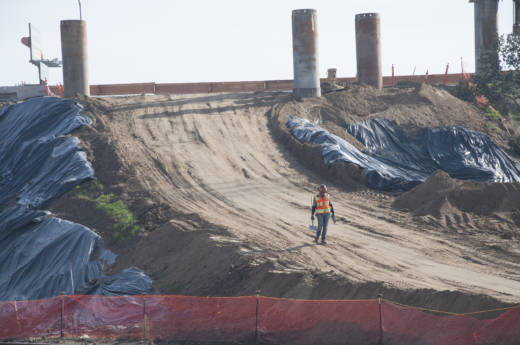"Much of today was a 'lessons learned' expression," said Brian Kelly, the state's current transportation secretary who was named as the authority's new chief executive Tuesday. "Because they learned these things the hard way on the early contracts they will not repeat them on the later contracts."
Critics seized on the news at the latest evidence the project is destined for failure.
"We now have a set of facts that is so clear that this authority simply is unable to produce the project, and making it up as they go along simply is not a sane approach," said Assemblyman Jim Patterson, R-Fresno. In November, he asked the Legislature to initiate an emergency audit of the rail project -- a request that was later denied.
[The Los Angeles Times notes that the cost increases disclosed Tuesday were anticipated by a federal report last year:
"The sobering news about the cost increases was long forewarned, though rail authority Chairman Dan Richard has consistently rejected those warnings. About a year ago, the Federal Railroad Administration issued a secret risk analysis that said costs were rising sharply and could hit $9.5 to $10 billion. When The Times disclosed the warning, Richard downplayed the analysis. In 2012, WSP briefed a cost analysis for the 2014 business plan, showing sharply higher costs in the Central Valley. The cost estimates were not adopted in the 2014 business plan. Richard was not available for an interview."]
A 2008 ballot measure passed by voters promised a train that would run from San Francisco to Los Angeles in under three hours by 2029, with the track eventually expanding to Sacramento and San Diego.
In October the rail board approved a $30 million contract with DB Engineering & Consulting USA, the U.S. arm of German rail giant Deutsche Bahn AG, to design and operate the train from the Central Valley to the Silicon Valley in its early stages.
A fresh estimate on overall costs and possibly the timeline will be included in a business plan the authority must submit to lawmakers this spring. Beyond the bond and federal dollars, money for the train comes from California's cap-and-trade program that taxes carbon emissions.
Gov. Jerry Brown, who will leave office a year from now, has been a champion of the project because it will be a cleaner and more efficient transportation option.
The candidates vying to replace him have a variety of perspectives on the bullet train, with some arguing it needs a better financing plan. The Legislature may get a one-time chance in 2024 to reallocate cap and trade money, which could hurt the rail project.
The uncertainty made it difficult to recruit a new chief executive after Jeff Morales left the job last summer after five years. Kelly will start the new job next month at a salary of nearly $385,000.
Richard, the board chairman, acknowledged the new governor will need certainty on the project's financing and timeline.
"I do feel that owe it to the next governor to provide a complete package to them of what this program looks like," he said. "I'd like to not have a lot of loose ends when we get to that point."

